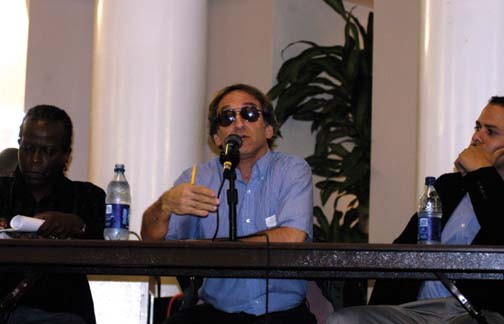
Panel of professors discusses civil rights in U.S. (Photo by Austin Kilgore, The Daily Campus)
The Hughes-Trigg Student Center Commons area was transformed into a breeding ground for history, heritage and hope Thursday evening as a group of five panelists converged to discuss the past, present and future of civil rights in America.
As part of a week-long celebration dedicated to the memory of Dr. Martin Luther King, Jr., the Department of Multicultural Student Affairs sponsored the panel that included Dedman School of Law professor Maurice Dyson, economist Dr. Mike Green, Dr. Dennis McDonald, a pastor at the Fellowship Bible Church in Lancaster, Tex., Dr. Theo Walker, a professor in the Perkins School of Theology, and Mr. Richard Williams, owner of Scratch Bake Bakery.
History professor Rick Halperin moderated the discussion, and he began the evening by reflecting upon the fact that centuries have passed since the first settlers arrived in America.
“Only since 1954,” he continued, “has the idea existed that skin color doesn’t matter.”
From Plessey v. Ferguson to Brown v. The Board of Education, Halperin touched on milestone events – both positive and negative – in the fight for civil rights, eventually centering on the heart of Texas.
“Dallas has the rather dubious distinction,” he said, “of being engaged in the struggle for integration. [The Dallas Independent School District] fought the Brown v. The Board of Education decision longer than any other major U.S. city.”
Halperin then turner over the microphone to Dr. Green.
“What is sometimes lost,” he began, “is the economic message of Dr. King. He wanted an immediate, direct and total abolition of poverty.”
Green explained that Dr. King aimed to create an “economic floor beneath which nobody would be allowed to sink.
“This idea of economic justice,” he continued, “is still a relevant one that needs to be put on our nation’s agenda.”
Dr. Green then gave the floor to professor Dyson, who took a close look at the downfalls of any form of segregation.
“Anytime you put a wall between two people,” he began, “there is a separation of resources. When we create separation, inequities will inevitably flow.”
Dyson also spoke of the economic message Dr. King left behind. “When you put people in a better position economically, you put them in a better position to be accepted by society.”
Next, Dr. Walker presented a collection of books by King, each of which made references to the struggle for abolition. In a piece of work titled “Where Do We Go From Here? Chaos or Community?” King announced his interest to abolish poverty.
Reading from the book, Walker quoted Dr. King, “’There should be no poor. Poverty is obsolete and needs to be abolished.’”
He continued by explaining the three abolition movements familiar to Americans: the abolition of slavery, which culminated in the Civil War, the abolition of segregation, which culminated in the Civil Rights Movement, and the abolition of poverty, which Dr. Walker feels has yet to begin.
“After Dr. King’s assassination,” he said, “all talk of abolishing poverty evaporated.”
Walker went on to discuss the present-day feelings about the poor, comparing a modern outlook of helplessness to the sentiment of those involved in the slave trade nearly 200 years ago.
“Once upon a time,” he explained, “when abolition first came up, we said, ‘Be realistic. We can’t abolish slavery. It can’t be done.’ Now we know that was wrong.
“Now it is time to pick up the third abolition movement.”
The issues of poverty and inequality were given a religious point of view when Dr. Dennis McDonald used his experience as a pastor to examine King’s actions.
“As a preacher, the thing that troubled Martin Luther King and still me today is that we practice Christianity in the name of one ethnic God.”
McDonald professed his view that some in this country claim a life of devotion to God while simultaneously committing the sin of racism.
“[Dr. King] showed America what she isn’t and what she claims to be. The problem today is that we cling to race as if it has some quality beyond the secular realm.”
The key, Dr. McDonald said, to keeping the visions of King and those like him alive is to continue learning and spreading their messages of faith and impartiality.
“If you don’t read books [by landmark writers], King and other great figures will become empty figures with no substance.”
Bakery owner Richard Williams was the final panelist to take the floor, opening with a grateful summary of his youth in California.
“Through my experience growing up on the West Coast during the Civil Rights Movement,” he stated, “I was blessed to be able to view such dynamic and exciting things changing America.”
Williams recalls the push for civil rights as a time of great enthusiasm. “I saw changes made in the hearts and minds of young people, and I was fired up.
“I was motivated to find out what my role in [the movement] was.”
Today, Williams continues to witness inequalities in his everyday life, most notably surrounding his business.
“I’ve owner a bakery for 20 years, and I have seen plenty of economic discrimination … I still do.”
Despite these bumps in the road to total racial equality, however, Williams, like his colleagues on the panel, maintains a bright view when looking ahead to the future.
“As long as we don’t give up the dream,” he said, “as long as we don’t quit, as long as we keep our eyes focused on who is really real – the Lord Savior Jesus Christ – we can keep our heads up and pass something on to the next generation that’s worth having.”









